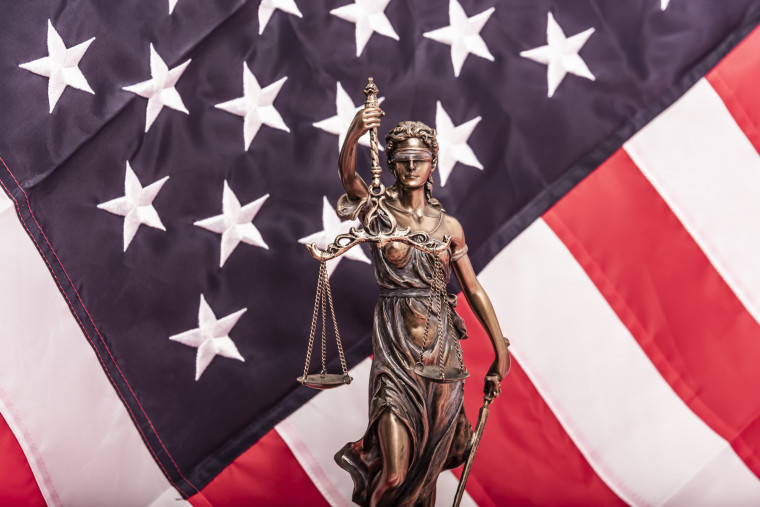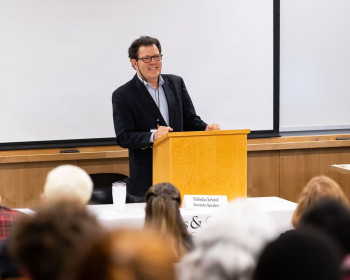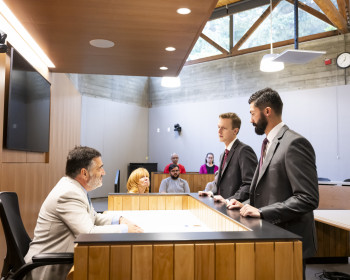Alumni Achieve a Historic Settlement in Fight Against Forever Chemicals
Lewis & Clark alumni helped win a $698 million settlement related to Monsanto’s role in the sale and promotion of PCBs.
Open gallery

Several Lewis & Clark Law School alums, serving as outside counsel to Oregon Attorney General Ellen Rosenblum, delivered a major victory for the State of Oregon after announcing a historic settlement agreement between the State and Monsanto Company, resolving claims related to Monsanto’s sale and marketing of polychlorinated biphenyls (PCBs).
Dan Mensher ’07, a leader of Keller Rohrback’s environmental practice group served as one of the outside counsel team, along with fellow Keller Rohrback attorneys Yoona Park ’07 and Kate McCallum LLM ’22 as well as Jen Wagner ’02, from Stoll Berne.
Mensher explained that as outside counsel, his firm Keller Rohrback and co-counsel at Stoll Berne “acted as the Attorney General’s main litigation team on this case, along with three DOJ attorneys. Our team drafted the complaint, oversaw discovery, found and worked with experts, drafted briefs, argued motions, and took and defended depositions. And Yoona Park and I were set to give the opening statement to the jury. Our close working relationship with the DOJ attorneys, paired our expertise with theirs to make a team that was more than the sum of its parts, and delivered a huge win for all Oregonians.”
After 4 years of litigation in Multnomah County Circuit Court, the agrochemical giant agreed to pay $698 million to the State. It’s the single largest environmental damage recovery in Oregon state history, and it will go a long way to cleaning up PCBs and addressing serious environmental justice concerns.
“This case sends a strong message to other companies that they can’t avoid responsibility for the harm their products cause to people and the environment,” says Dan Mensher. “Until now, such manufacturers have escaped significant liability despite the fact that they knew what they were doing, and chose to pass along the burden of these forever chemicals to people and communities while pocketing all their profits. I went to law school with the aim to hold companies accountable for the messes they make. I remember my granny telling me we couldn’t swim in the Duwamish River in Seattle because it was too contaminated with PCBs. That I have been able to help Oregon, in this case, means the world to me.”
Kate McCallum began her legal career in Australia and earned her environmental law LLM from Lewis & Clark Law School in 2022. An externship during her LLM introduced her to the case and she is now a full-time attorney at Keller Rohrback. “My experience in the LLM program, including as a clinic student at the Earthrise Law Center working on environmental public interest cases, helped prepare me for this work and transition my legal skills to the U.S. legal system.”
Monsanto was the only manufacturer, seller, and distributor of PCBs until it was banned in 1977. Yet, despite being banned for 46 years, PCBs do not readily break down and can travel long distances. Because of this, the legacy of Monsanto’s pollution is still being felt today. Oregon’s complaint alleged Monsanto was aware of the chemical’s highly toxic nature as early as 1937.
According to the CDC, exposure to PCBs, and their associated adverse health effects, occurs primarily through ingesting high-fat foods like fish. As a result, Native American and AAPI communities with high fish consumption rates have had an even higher risk of PCB exposure than the general population. Additionally, the chemicals transfer from mother to child in utero and while breastfeeding, creating an intergenerational burden from these chemicals.
The toxicity of PCBs and their disparate impact on vulnerable communities make them a serious, ongoing environmental issue across multiple contexts. A 1982 fight over PCBs in North Carolina is frequently credited as the birthplace of the environmental justice movement. But the compound is also part of a larger class of highly toxic chemicals that continue to pose serious problems across the country. High-profile examples include DDT, the pesticide, and Dioxin, a byproduct that occurs when organic material is burnt in the presence of chlorine. In a recent example of this national threat, EPA ordered Norfolk Southern to test for Dioxins at the East Palestine train derailment site.
Law Communications is located in room 304 of Legal Research Center (LRC) on the law Campus.
MSC: 51
email jasbury@lclark.edu
voice 503-768-6605
Cell: 626-676-7923
Assistant Dean,
Communications and External Relations, Law School
Judy Asbury
Law Communications
Lewis & Clark Law School
10101 S. Terwilliger Boulevard MSC 51
Portland OR 97219

